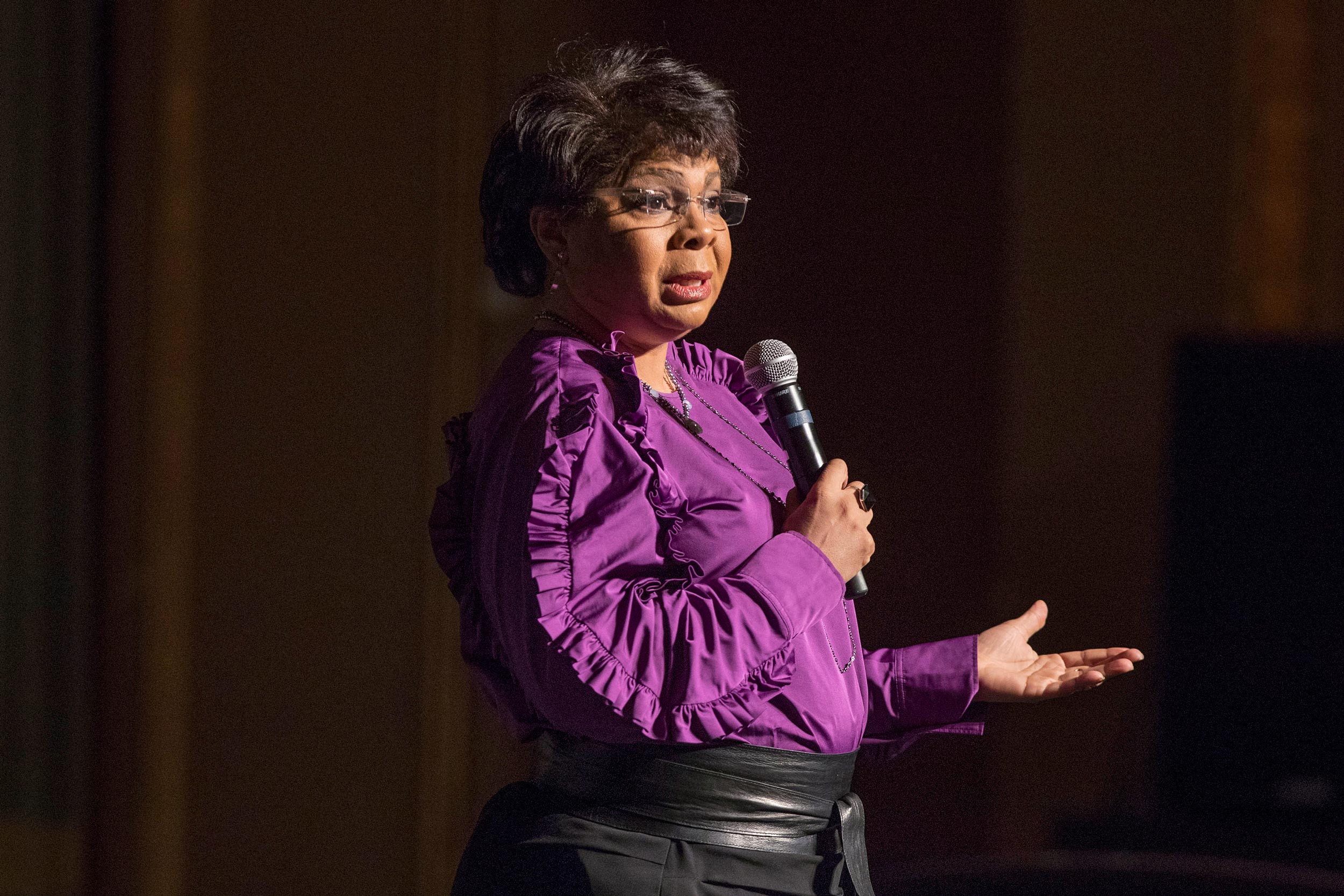Journalist April Ryan responded warmly to the enthusiastic crowd who not only came out on a freezing night Wednesday to hear her remarks at the Paramount Theater, but gave her a standing ovation as she took the stage as the keynote speaker for the 2019 Community Martin Luther King Celebration.
“That warms my heart on this cold night,” she said.
Ryan, who said she prefers to describe herself as a White House correspondent who is also a black woman, joked and chatted with members of the audience as she eschewed the lectern to stroll back and forth across the stage. In a conversational style, she touched on a range of topics from the August 2017 “Unite the Right” rallies in Charlottesville to the legacies of King and black women in American history.
Ryan’s visit was sponsored by the University of Virginia’s Office of the Vice President and Chief Officer for Diversity & Equity, in partnership with UVA’s Frank M. Batten School of Leadership and Public Policy and the Lifetime Learning program in UVA’s Office of Engagement. All 1,100 free tickets were reserved in advance, including a block for students who made the five-hour trip from UVA’s College at Wise.
Driving through a snowstorm in Baltimore earlier Wednesday, Ryan said, she was motivated to get here because she has come to love Charlottesville since speaking at the Virginia Festival of the Book in March 2017.
She praised the community for its responses to the ordeal of white supremacy demonstrations four months later.
“I knew Charlottesville before it was a verb,” she said. “What happened shook me, shook the world. But the people stood up to the bullying, the racism, the hate.”
About the rallies that turned violent, she said her heart broke for the lives lost.
Reflecting on the Rev. Martin Luther King Jr., who would be 90 this year, she pointed out that he sought to make the comfortable uncomfortable in his quest to change the system and expand equality and justice to all. Ryan questioned how much the system has really changed.
“We’ve come so far, but taken so many steps back,” she said, citing incidents like Unite the Right, the October shootings at a Pittsburgh synagogue and the attack just days ago on “Empire” television actor Jussie Smollett that reportedly was motivated by racism and homophobia.
She also warned about the rollback of part of the Voting Rights Act and the voting restrictions that some states have enacted.
She reminded the audience that it is only in the past 50 out of 400 years that African-Americans have been able to enjoy many of the fruits of this country’s democracy.
Sometimes when she’s doing her job as a White House correspondent, she said she thinks how she wouldn’t be standing there if it wasn’t for the Civil Rights Act. “I wouldn’t be allowed to be here,” she added.
Ryan took up the theme of this year’s MLK commemoration series, “Women in the Movement,” spotlighting several African-American women from slavery to civil rights, as well as many of the unknown helpers who opened their doors to young civil rights protesters, from the 18-year-old young men who staged sit-ins at lunch counters to famous activists like Harry Belafonte and John Lewis.
She said her mother used to tell her about black history, “the beauty of our culture,” and to be proud of who she was.
One person her mother spoke of was Harriet Tubman, an ex-slave with no formal education who risked so much to help people who escaped slavery reach freedom. After herself escaping slavery, Tubman worked in the “Underground Railroad,” repeatedly helping others make the perilous journey.
“We hope she will grace the $20 bill,” Ryan added about an initiative now stalled by the Trump administration.
Besides the unnamed women who were involved in the civil rights movement, Ryan cited Rosa Parks, Shirley Chisholm and Mary Frances Berry for their activities.
She called Berry, a professor of history and law who served on the U.S. Civil Rights Commission in the 1980s (and as chair from 1993 to 2004) a “mentor” who recounted conversations with Coretta Scott King about what Martin would do if he were alive.
Chisholm was the first black woman to win a seat in Congress (in 1968) and the first to campaign for U.S. president, in 1972. Ryan quoted her saying, “If there’s no seat at the table, bring a folding chair.”
When it came to sitting down, Parks might’ve seemed meek when she sat down on that bus in protest, but she created a stir that could not be ignored, Ryan said, leading to more organized effort in the civil rights movement.
“If it wasn’t for Rosa sitting down, I wouldn’t be smack-dab in the third row standing up at the White House press conferences,” said Ryan, who works for American Urban Radio Networks and often appears on CNN as a political analyst. “As a reporter, I’ve been blessed to cover four presidents. Twenty-two years in, I’m still standing.
“I report because of you and what you’re doing. If you didn’t rise up, what would the story be?”
Ryan said what all these women had in common, as well as other civil rights workers, and the legacy they left was the blueprints for how to organize and leverage what they had for what they were working for – freedom and civil rights.
After the event, part of the annual two-week celebration commemorating King, Ryan signed books in the lobby. She is the author of “The Presidency in Black and White,” published in 2015; “At Mama’s Knee: Mothers and Race in Black and White” (2016); and her latest, “Under Fire: Reporting from the Front Lines of the Trump White House,” which came out in September.
Media Contact
Article Information
January 31, 2019
/content/journalist-april-ryan-lauds-charlottesville-and-black-women-history

